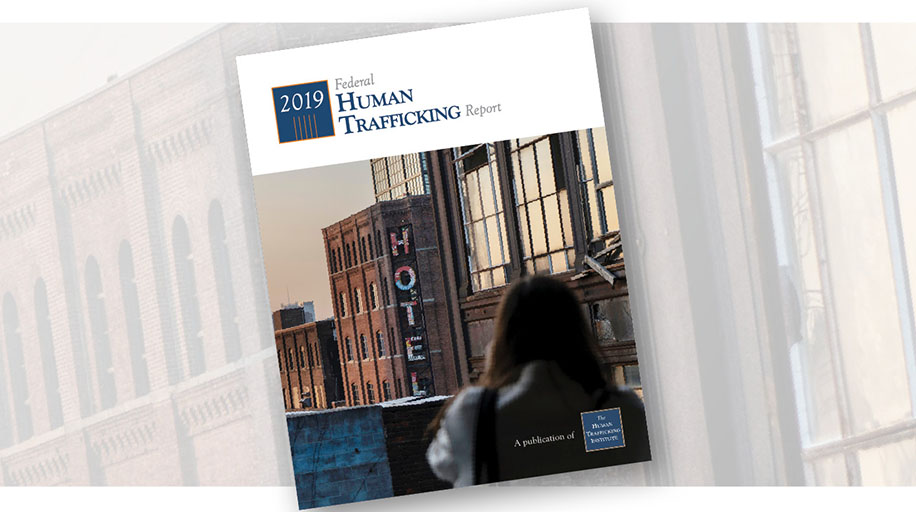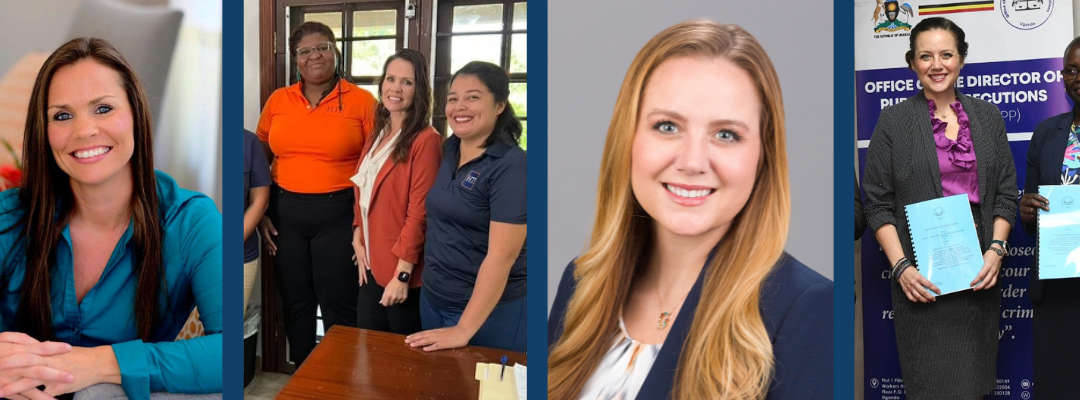The 2019 Federal Human Trafficking Report was released today on the Human Trafficking Institute’s website. The Report, a project of the Institute, is a continuation of the Institute’s efforts to provide comprehensive data about every criminal and civil human trafficking case that federal courts handle each year.
In 2019, there were a total of 606 criminal human trafficking cases in U.S. federal courts (including new cases, pending cases, and cases on appeal) with a total of 1,058 total active criminal defendants – 103 of those were buyer defendants who were charged with purchasing (or attempting to purchase) commercial sex. The year also produced 339 convictions with an average prison sentence of 143 months, or almost 12 years.
Human trafficking is an economically-motivated crime committed by traffickers who compel victims to work or to engage in commercial sex acts. U.S. federal law criminalizes human trafficking and provides protections for victims. An effective public justice system is an essential part of a victim-centered and trauma-informed approach to handling trafficking cases. For the third year in a row, the 2019 Federal Human Trafficking Report employs a comprehensive methodology to reveal trends for the types of cases, conduct, and vulnerabilities that traffickers exploit for their profit in the United States.
“The Federal Human Trafficking Report helps practitioners and the public alike see how, where, and under what circumstances the United States is holding traffickers accountable in the federal system,” said Lindsey Roberson, Institute Senior Legal Counsel and 2019 Report Editor.
1. An overview of federal human trafficking case profiles, including data about defendants, victims, types of recruitment, and methods of coercion used in forced labor and sex trafficking schemes.
2. An in-depth and data-driven analysis of criminal investigations and prosecutions for 2019, and how they stack up to years’ past.
Additionally, the Report includes thoughtful insight into civil lawsuits filed to hold traffickers liable for their conduct in a variety of industries.
“The Federal Human Trafficking Report is providing objective data to inform discussions by policymakers, researchers, journalists, and nonprofit leaders,” said Victor Boutros, Institute CEO. “Last year’s report was used as a resource by national media outlets, in reports by leading nonprofit organizations, and by government agencies and international organizations. One government leader described it as the most reliable cross section of human trafficking data within the United States. Our goal is to continue to fill this needed gap in data collection to support trafficking prosecution in the United States, while also providing a vision for this type of data collection in other countries.”
The 2019 Report builds upon the 2017 and 2018 Reports by including data from selected years in federal human trafficking law and enforcement. This includes cases initiated in 2000, when the Trafficking Victims Protection Act (TVPA) was enacted and the following eight years, as well as cases filed in 2015 through 2019. The Institute will continue adding historical data with the goal of presenting an exhaustive review of all human trafficking cases in federal court in the 20 years since the enactment of the TVPA in its 2020 Report.
Highlights from the 2019 Report:
- The federal government initiated 145 new criminal cases and charged 271 new defendants. This is the lowest number of cases filed and defendants charged in at least the past five years.
- Though new criminal prosecutions decreased, the number of new civil human trafficking suits filed in 2019 increased 125.6%, from 39 in 2018 to 88 in 2019.
- Over the past two years, federal prosecutors have filed 33.5% fewer human trafficking cases, corresponding with a 33.7% drop in defendants charged.
- The Federal Bureau of Investigation was the primary investigative agency in 71.6% (73) of the criminal human trafficking cases filed in federal courts.
- 94.9% of active criminal cases were sex trafficking, while 5.1% were forced labor.
- Federal courts convicted 324 defendants in sex trafficking cases (a 15% increase from 2018) and convicted 15 defendants in forced labor cases (a 21% decrease from 2018).
- The Southern District of California charged 28 defendants, the highest number of new defendants prosecuted in one district in 2019.
- When taking population into account, the Virgin Islands, Northern Mariana Islands, District of Columbia, South Dakota, New Mexico, and Vermont prosecuted the highest number of active defendants (per capita) in federal human trafficking cases in 2019.
- In nearly a third of all active criminal sex trafficking cases, defendants controlled their victims without using violence, which included withholding pay, verbal or emotional abuse, and exploitation of substance dependency.
- For at least the past five years, traffickers used the internet as their predominant method of solicitation, accounting for more than 80% of criminal sex trafficking cases each year.
- In criminal forced labor cases, victims were most commonly compelled to provide domestic work or forced to work in the restaurant, food, or agricultural industries, and traffickers often used coercive means targeting a victim’s status as a foreign national.
- The average age of active defendants was 35 years, with the oldest being an 80-year-old woman charged in a forced labor case and the youngest being several 18-year-old men and women in sex trafficking cases.
- Courts ordered only 39.9% of convicted human traffickers to pay mandatory victim restitution.
The 2019 Federal Human Trafficking Report’s findings are not a prevalence estimate of trafficking in the United States, but instead serve as an objective summary of how the federal system holds traffickers accountable for their exploitative conduct. The Report does not capture data from state prosecutions, state civil suits, or unreported human trafficking cases.
A team of seven attorneys and six law school students reviewed every human trafficking case in the federal court system in 2019. Court documents, press releases, and news sources were reviewed, and prosecutors across the country were consulted, to gather a comprehensive set of data that includes: type of trafficking case, profile of the trafficker, details about the trafficking scheme, age of the victim, and district where the case took place, among others. The complete report can be downloaded here.




